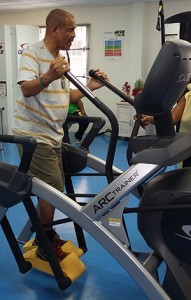- January 15th, 2016
- /
- NCD Stories
- /
- 0 Comments
- /
- Living with a stroke: one family’s story
Trevor Redhead had a stroke in May 2014. His wife Beverley and daughter Tara talk about the profound effect this event has had on their lives.

Beverley Redhead was asleep in the early hours of the morning when she heard a thud. Her husband of many years, Trevor, had collapsed on his way to the bathroom. The sound of Trevor falling marked the end of an old life and the beginning of a new, more stressful and difficult one, for the 70 year-old retired Harrods manager and his close-knit family. He had suffered a severe stroke.
His daughter Tara, who has returned to Barbados from England to help support her family, recalls the sense of shock she felt after the diagnosis. “We’ve never really had an illness like this in the family. I’d never known dad to be sick apart from sniffles. To be honest, it has taken me quite a while to come to terms with what has happened. I would keep remembering my Dad as he was.”
Profound adjustments
The stroke occurred in May 2014 but since then Trevor has made remarkable progress, although he still has speech and cognitive deficits, including memory loss. The family have had to make profound adjustments. For Beverley, watching a man who was both very gregarious and very athletic struggling with simple speech and orientation, has been extremely tough.
“I experience moments of sadness, especially when I think of the many things he was capable of and the many plans he had for the future.”
Beverley Redhead
“It can be a quite challenging to cope at times. Trevor requires a lot of support that he didn’t need before, for example, help and supervision with activities of daily living. He requires a lot of psychological and physical support.” She adds, “Our social life has also changed; it’s much more difficult now to go to the places we used to, though we still do manage to get out and about.”
Emotional impact
There has also been a deep emotional impact of the Illness on Beverley too. “I experience moments of sadness, especially when I think of the many things he was capable of and the many plans he had for the future. I miss our conversations too. Trevor can understand what one is saying to him but struggles to respond vocally due to his aphasia¹.”
Despite their lives having altered so significantly, Beverley and Tara try to remain encouraged and optimistic. They have used prayer to help them come to terms with what has happened. “You just have to take one day at a time,” says Tara, “There’s nothing else you can do.” Her mother continues, “Yes, we’ll get through it. I’m one to never give up.”
Trevor Redhead is one of the nearly 80% of Barbadians over the age of 65 who has high blood pressure, a leading cause of stroke. More than half of those over 45 suffer from hypertension.
¹Aphasia is a speech and language disorder caused by damage to the brain



